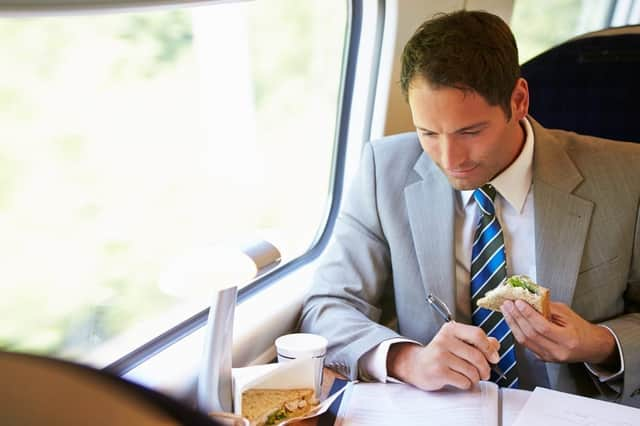Top doctor thinks snacking should be banned on public transport


Snacking should be banned on public transport, according to England’s outgoing chief medical officer.
Dame Sally Davis called for the ban in her final report as CMO, and also said taxes on unhealthy foods should rise to help tackle child obesity.
Advertisement
Hide AdAdvertisement
Hide AdShe said that children are “drowning in a flood” of unhealthy options due to over advertising by takeaways and fast food companies.
The target to halve obesity rates by 2030 would not be met unless ministers took “bold” action, she added.
The report described the current situation as an “obesity crisis”, with the number of obese and overweight children having doubled in the last 30 years. Around a third of children are obese or overweight by the age of 11.
Obesity crisis
Dame Sally said, "The unavoidable fact is that over time our environment has become very unhealthy without us realising.
Advertisement
Hide AdAdvertisement
Hide Ad"Our children are now suffering from painful, potentially life-limiting disease.
"Our politicians need to be bold and help everyone embrace healthier life choices."
Obesity rates are still on the rise in some of the most deprived communities, and the problem in the UK is most acute among girls, where the UK has one of the highest rates in the world.
This increases the risk of illnesses like cancer and heart disease, and more than 100 cases of type 2 diabetes - previously considered an adult illness - are reported in children each year.
Advertisement
Hide AdAdvertisement
Hide AdThe ban on eating on public transport is aimed at children on their way to and from school. It would apply on local transport such as buses, metros and trams.
Inter-city trains, where there are buffet cars and trolleys, would not be included in the ban.
However, the ban would also apply to adults, as the CMO said they ought to be good models for children.
Drinking water, breastfeeding, and those who need to eat for medical reasons, would be exempt from the new rules.
What are the other measures?
Advertisement
Hide AdAdvertisement
Hide AdA range of policies were suggested in her report, which included extending existing measures to promote a healthy lifestyle, as well as adding completely new ones.
These include:
- Phasing out all advertising and marketing of unhealthy food and drink- Banning food and drink on local transport. Water, breast feeding and food needed for medical conditions would be exempt.- Free water refills at all food outlets, transport stations and public sector buildings- Regular car-free weekends across the country to encourage exercise- Making it harder to get planning permission to open takeaways- Extending sugar tax to include milk-based drinks- Adding VAT to unhealthy products that are currently zero-rated, such as cakes- Capping calories in food served out of the home- Potentially putting junk food into plain packaging, as with cigarettes, if fast-food companies do not reduce salt, fat and sugar levels quickly enough- All nurseries, registered childminders and schools adopting water and milk-only policies
How likely is it that steps will be introduced?
None of the major measures recommended by Dame Sally are currently in the government’s plan to halve obesity by 2030.
Health Secretary Matt Hancock praised Dame Sally’s work as CMO, and said that the government would pay “close attention” to her recommendations.
Advertisement
Hide AdAdvertisement
Hide AdHowever, Boris Johnson has, in the past, expressed a dislike for “sin taxes” on things like unhealthy food. So whether or not a government led by Johnson would take the suggestions on board is uncertain.